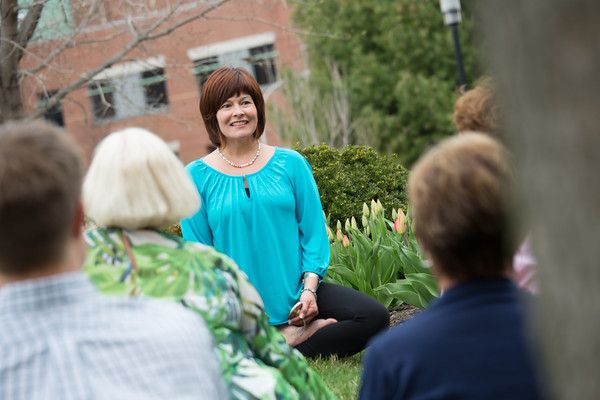Cancer has unfortunately been a part of my life for a really long time.
My dad, a heavy chain-smoker, was diagnosed with lung cancer when I was 17 years old. He died just a few days later. That was really my motivation to get into the oncology field — I don’t want other people to have to go through anything like that.

My background is in journalism, and through that field, I began my journey into healthcare when I served as the founding executive producer of CNN Accent Health, a healthcare television network for physicians' waiting rooms. I eventually developed an interest in integrative therapies and have been in my current role as a mind-body specialist for about five years.
I am passionate about my career because I believe (and research has shown) that, in addition to traditional cancer treatment, there is much room for other therapies that will help mitigate side effects and potentially even improve outcomes. That’s where the mind-body connection comes in. When patients go through their treatment, oncologists are trained to look at the disease and the biology of the cancer, not necessarily the whole person. However, there is a benefit to considering where the patient is at physically, emotionally, spiritually, financially, etc.
When I first meet with a patient, I spend about 90 minutes learning what’s going on in their lives besides the cancer diagnosis. I ask them to consider their top three challenges in life: Write it on paper. Then we can begin putting together steps to improve their quality of life. We take into consideration physical activity, nutrition, stress-reduction techniques and contemplative practices (yoga, breathing, meditation, qi gong, etc.) and more.
Mind-body therapy is an exciting field that’s emerging in integrative oncology. The research in the last 10-20 years around the efficacy of yoga, meditation and these other contemplative practices is so robust, and it’s showing us that these ancient practices are proving to be beneficial. When you do these practices, you are actually changing your physiology. We know that cancer, chemo and radiation are all inflammatory. These mind-body practices are anti-inflammatory and elicit the relaxation response. It’s powerful, low-cost, evidence-based and available to anyone, regardless of socioeconomic status. These practices can also help correct health disparities — especially if you can teach these techniques.
Did You Know?
Contemplative practices have elements that can be used across the whole care continuum, from diagnosis to treatment to survivorship. When many people hear yoga, they think of the American version of it. They think they have to be flexible and feeling well to make shapes with their body. That’s actually not what yoga is. Rather, yoga is any activity that is done with awareness. It could be vacuuming, folding your laundry, sitting and meditating, moving your body the way you would in a traditional yoga class or even just synchronizing your breathing. All these activities, when done with awareness, can provide the benefit of reducing stress.
Spreading the Message Across the World
I spent this past summer in the National Institutes of Health/ National Cancer Institute Cancer Prevention Fellowship Program Summer Curriculum in Cancer Prevention and Control. I was with cancer scientists and oncologists from 35 countries, and it was really amazing to see all the different perspectives from my colleagues. We all came together to brainstorm, share what was happening in our own countries, and ultimately come up with how to implement mind-body practices globally. The future looks bright, and we will continue to work hard to find solutions for cancer patients.
Never miss another Cancer Talk blog!
Sign up to receive our monthly Cancer Talk e-newsletter.
Sign up!
